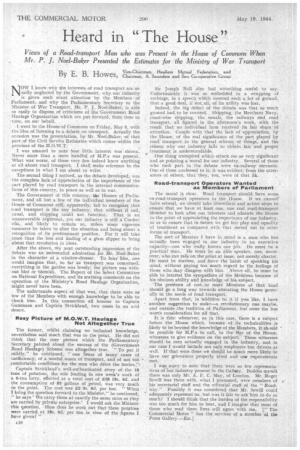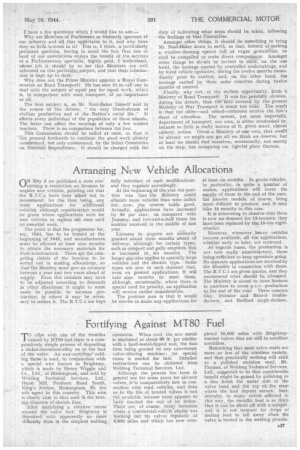Heard in "The House"
Page 36

Page 37

If you've noticed an error in this article please click here to report it so we can fix it.
Views of a Road-transport Man who was Present in the House of Commons When Mr. P. J. Noel-Baker Presented the Estimates for the Ministry of War. Transport By E. B. Howes Vice-Chairman, Hauliers Mutual Federation, and , Chairman, A. Saunders and Son Co-operative Group NOW I know why the interests of road transport are so sadly neglected by the Government, why our industry is given such scant attention by the Members of Parliament, and why the Parliamentary Secretary to the Minister of War Transport, Mr. P. J. Noel-Baker, is able so easily to dispose of criticisms of the Government Road Haulage Organization which are put forWard, from time to time, on our behalf,
I went to the House of Commons on Friday, May 5, with the idea of listening to a debate on transport. Actually the occasion was the presentation, by Mr. Noel-Baker, of that part of the Civil Service Estimates which comes within the province of the M.O.W.T: I was amazed to note how little interest was shown. Never more than a mere handful of M.P.s was present. What was worse, of these very few indeed knew anything at all about road transport. I shall make reference to the exceptions in what I am about to write. .
The second thing I noticed, as the debate developed, was the complete lack of appreciation of the importance of the part played by road transport in the internal communications of this country, in peace as well as in war.
The Government of this country, the Houses of Parliament, and all but a few of the individual members of the House of Commons still, apparently, fail to recognize that road transport is the key industry, that without it rail, canal, and shipping could not function. That is an unanswerable argument, yet our industry is still a Cinder: elle, and likely to remain so, unless some vigorous measures be taken to alter the situation and bring about a recognition of its predominant position. For it will take more than the loss and finding of a glass slipper to bring about that revolution in ideas.
After the above, my next outstanding impression of the debate was an 'unbounded admiration for Mr. Noel-Baker in the character of a window-dresser. To hear him, one would imagine that, so far as transport was concerned, everything in the garden was lovely; the picture was without blot or -blemish. The Report of the Select Committee on National Expenditure, and its scathing comments on the operation of the Ministry's Road Haulage Organization, might nevei have been.
• The unfortunate aspect of that was, that there were so few of the Members with enough knowledge to be able to check him. In this connection all honour to Captain Gam-mans and Captain Strickland, two oases in an arid desert.
Rosy Picture of M.O.W.T. Haulage
Not Altogether True The former, whilst claiming no technical knowledge, nevertheless said much that was to the point. He did not think that the rosy picture which the Parliamentary Secretary painted about the success of the (Government Road Haulage) Scheme was altogether true, "To put it mildly," he continued, "one hears of Many cases of inefficiency, of a woeful waste of tranSport, and of not tott comfortable conditions for the men who drive the lorries.'' Captain Strickland's well-authenticated story of the 18 tons of potatoes, the sole loading in one week's work of a 6-ton lorry, effected at a total cost of £38 18s. 8c1. and the consumption of 83 gallons of petrol, was very much to the point. The cost was £2 3s. 6d. per ton. "When I bring the question forward to the Minister," he continued, " he says We carry' them at exactly the same rates as they are carried by private enterprise.' I would ask the Minister this question. How does he work out that these potatoes were carried at 18s. fid. per ton in view of the figures. I have given? "
• 426 Sir Joseph Nall also had something useful to say. Unfortunately it was so embedded in a wrapping of verbiage, in a speech which covered such a lot of ground. that a good deal, if not, all, of its utility was lost.
Indeed, the big defect of the debate was that so much ground had, to be covered,. Shipping, the Merchant Navy, coast-wise shipping, thel. canals, the railways ad road transport, all figured in the afternoon's work, with the result that no individual item received it fair share of attention. Couple with that ' the lack of appreciation, by the House, Of the real significance of the part played by road transport in the general scheme of things, and the reason why our industry fails to obtain fair and proper treatment is understandable. e One thing transpired which struck me as very significant and at pointing a moral for our industry. Several of those , who took part in the debate were ex-railway' servants. One of them confessed to-it: it was evident; from the uttee• ances of others, that they, too, were of that ilk.
Road-transport Operators Wanted as Members of Parliament The moral is clear. Road transport should have some • ex-road-transport operators in the House. If we cannot' hare several, we should take immediate and active steps to ensure that we have at 'least one, one real road-transport Member to look after our interests and educate the House to the point of appreciating the importance of our industry, so as to ensure that in duthre we get fair play and equality of treatment as compared with that meted out to other forms of transport.
The sort of Member I have in mind is-a man who has -actually been engaged in our industry in an executive capacity—one who really knows our job. He must be a practical man. He must be an able speaker, one, more. over, who can talk on the point at issue, not merely chatter. He must be fearless, and have the habit of speaking his mind, without paying too much regard to the feelings of those who May disagree with him. Above all, he must be able to interest "the sympathiee of the MeMbers because of his obvious ability atid knowledge of 'his subject. .
The presence of one or more Members of that kind should go a long way towards educating the House generally in the needs of road transport.
Apart from that, in 'addition to it if you like, I have another suggestion to make—a revolutionary one maybe, and outside ...the tradition of Parliament, but none the less worth consideration for all that.
It is this: whenever, as in this case, there is a subject before the House which, because of its technicalities is likely to be beyond the knowledge of the Members, it should ' be possible for M.P.s to call, to the' Bar of' the House, witnesses to give evidence on the subject. ' These witnesses should be men actually engaged in the industry, and in our case I would include not only.employers but drivers as well. If that were done we should be much more likely to have our grievances properly aired and our requirements met.
I was sorry to note that there were so few representatives of Our industry present in the Gallery. Besides myself there was only Mr. A. F. C. May, of London. Mr. Roger Sewill was there with, what I presumed, were members of e his secretarial staff and the editorial staff of the " Roadway." PosSibly it was considered that Mr. Sewill could adequately represent us, hut was it fair to ask 'him to do so much? I should think that the burden of the responsibility was too much for him to bear, and I imagine that most of those who read these lines will agree 'with me. [" The Commercial Motor " has the services of a member of the -Press Gallery'.—En.] I have a few questions which I would like to ask:— Why are .Members of Parliament, so blatantly ignorant of our industry and all that appertains to it, and why have they so little interest in it? This is, I think, a particularly pertinent. question, having in mind the fact that one at least of our associations enjoys the benefit of the services of a Parliamentary -specialist, highly paid, I understand, %%those job it should be to see that Members are well informed on this particular subject, and that their information is kept up to date.
Why does not the Prime Minister appoint a Royal Commission on Road Transport?. He has seen fit to call one to deal with the subject of equal pay for equal work, which is, in comparison with road. transport, of no importance at all.
The first subject is, as Mr. Noel-Baker himself said in the course of the debate, " the very blood-stream of civilian production and of the Nation's social It affects every individual of the population of these islands. The latter can affect the earnings of only a few women teachers. There is no comparison between the two.
This Commission should be called at once, so that it can proceed forthwith to continue. the good work already commenced, but only commenced: by the Select Committee on National Expenditure. It should be charged with the
duty of indicating what steps should be taken, following the findings of that Committee.
Amongst other things, it should do something to bring Mr. Noel-Baker down to earth, so that, instead of making a window-dressing speech full of vague generalities, he shall be compelled to make direct comparisons. Amongst other things he should be invited to show, on the one hand, the tonnage carried by controlled undertakings, and by hired vehicle operators, during the twelve months immediately prior to control, and, on the other hand, the tonnage carried by these same concerns during twelve months of control.
Finally, why not, at the earliest opportunity, form a Ministry ofRoad Transport? It was too painfully obvious, during the debate, that the field covered by thepresent Ministry of War Transport is much too wide. The result is that the older—and vested—interests receive the lion's share of attention. The newest, yet most importafit, department of transport, our own, is either overlooked 'or, becauSe so little is really known of it, given scant, almost cursory, notice. Given a Ministry of our own, that would be altered: we mightmot get all we think we deserve, but at least we should find ourselves, occasionally, not merely on the map, but occupying our rightful place thereon.




























































